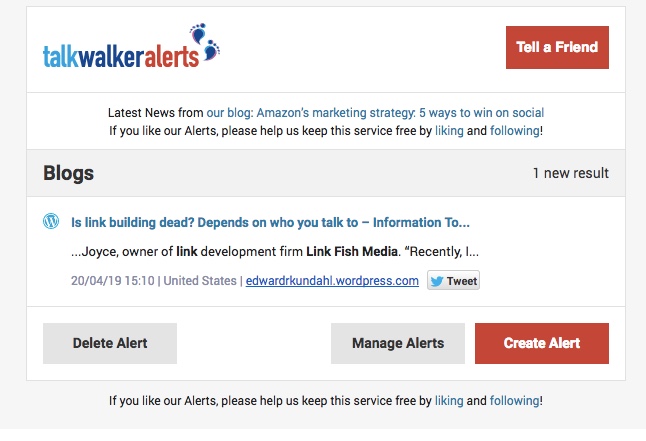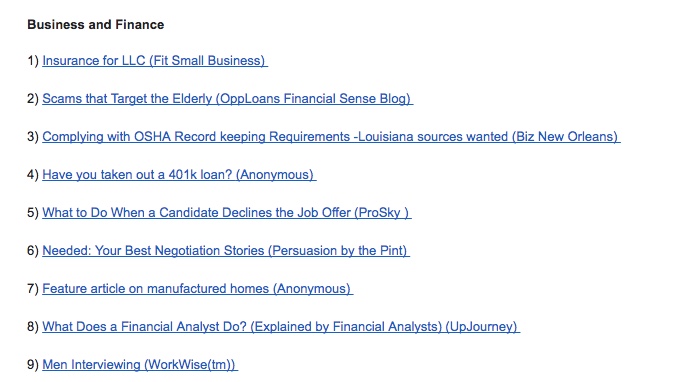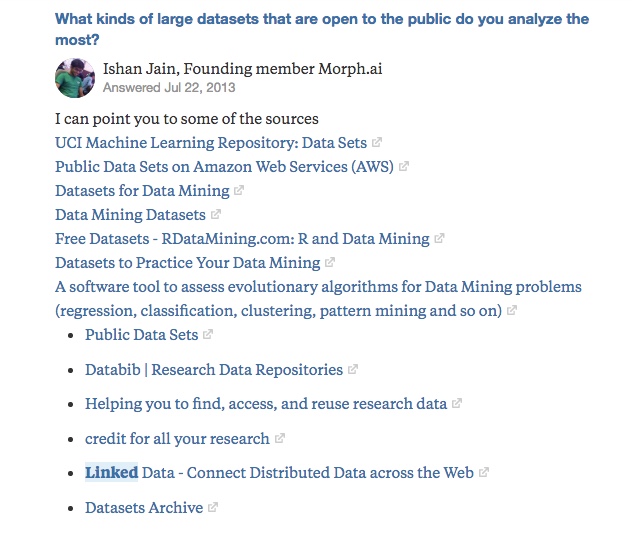When you’re just starting to build links for a new website, you may be overwhelmed by the links your competitors have and the very idea that getting links is going to be a pretty intense endeavor.
You can get some quick and easy links, but the really good ones usually take time.
However, there are many other components of link building outside of asking for/attracting a link itself.
Your site needs to be link-worthy, for one thing. Links also can happen via offline channels.
Let’s discuss 20 ways to start building links.
1. Make Sure You Have Good (& Hopefully Great) Content Before You Start Building Links
See what’s already out there and do it better, or do it differently. Even better, see what’s not already out there and create something.
Evergreen content is always going to be a good idea. You can buy links to any content. You can’t always build good links to it though.
Without interesting and relevant content, you’re going to be behind before you even get started.
2. Make Sure You Don’t Have Any 404s & That All Your External Links Work Properly
Both of these are bad for usability. There are various tools to help you check these (e.g., Google Search Console, crawlers).
Just as you put yourself at a disadvantage with subpar content, you put yourself at a disadvantage by having broken links.
3. Make Sure the Pages You’re Targeting Are Indexable
If I had a nickel for every time I saw an entire site blocked by robots.txt.
In fact, I recently audited a site that was blocked and had been for the past two years apparently.
It still happens.
4. Claim All Your Social Channels & Link to Them from Your Site
It takes a lot of time to grow a useful following for a new site so you might as well get started ASAP.
If you have blog posts or articles you’d like socialized, make sure there are buttons for that purpose.
I’m still amazed by sites that make it difficult to tweet a link to an article.
5. Set up Google & Talkwalker Alerts for Your Brand, Your Competitors & Relevant Keywords
You’ll get an email listing newfound mentions. If you see your site mentioned without a link, reach out and ask for a link to be added.
Maybe you’ll see that a competitor is mentioned in an article and you get a great idea from it.
Maybe you’ll see a great resource in your industry and you can reach out and get a link for your site (seriously though, check to make sure you don’t actually have a link before reaching out.
I say that from experience training someone on this.) Alerts are free by the way!

6. Make Use of HARO
HARO stands for Help A Reporter Out. It’s also free!
Journalists who are looking for sources to use in their articles ask for help and if you get in touch and they like what you’re offering, you can get some really nice links.
I also like to use HARO to generate ideas for new content, especially if we can find a way to do those ideas in a different format.

7. Answer Questions on Quora
Quora is a good place to start building your authority in an area. It’s also a great way to get ideas for new content.
If you do get a link here, it’s going to be nofollowed so there won’t be any ranking benefit but we can’t forget that nofollowed links are still great for traffic.

8. See Which Links Your Competitors Have, Make a List & Reach out to Those Sites
You can do this in your link tool of choice.
I would not recommend that you try and completely mimic your competitors’ profiles though. Just like any other site, they probably get a lot of crappy links that you’d never want to replicate.
I’ve actually had a (former) client show me some really, really bad links his competitor got (through no effort of his own hopefully as they were truly atrocious) and ask if they were worth pursuing.
If it’s a link you’d want in general, go for it. If you’re thinking of getting one just because your main competitor is linked, don’t bother.
9. Every Week, See What New Links Your Competitors Have
You probably won’t want to try to mimic all of them, and you may not see any sites where you’d like a link for yourself, but every now and then you might find a good opportunity.
10. Try to Utilize Unique Types of Content (Such as Video) Instead of Simple Text Pieces
Adding unique visual elements to content helps it stand out more.
My friend recently published a beginner’s yoga book and used drawings of people to illustrate poses instead of photos of real people, and it’s been very well received.
Several people at her book opening commented on how much they liked the drawings because they were done imperfectly and that appealed to them as they were nervous about always getting into the proper form.
Sometimes the visual bit is what sells (and leads to more links.)
11. Break up Longer Content Into Separate Releasable Chunks
I was recently part of a video series where snippets from the longer video were released separately, leading up to the release of the full video.
I’ve bought books because of the first chapter being inserted at the end of a book by the same author. Previews of more to come can really work well and keep people interested.
If you’re going to release a big guide, break it up into sections that can stand on their own, for example. Maybe those sections can each generate some links.
12. Interview Interesting People on Your Site
I’ve participated in a lot of interviews and a few of them really stand out to me as the questions asked were not the same questions everyone else was asking me.
If you are going to interview someone, see what they’ve answered before and go in a different direction.
You won’t always get a link from the person you interviewed but much of the time you will get some social love, and that can sometimes lead to links.
13. Do Some Offline Branding (T-Shirts Anyone?)
Anything that gets your brand in front of someone is a chance for a link.
That’s an ambitious statement, but a lot of offline marketing and word of mouth leads to conversions of a sort.
Maybe you get a new client.
Maybe you meet someone who’s looking for someone to help a friend with a service that you provide.
Maybe you get a link from a local blogger or you’re featured in the news.
14. Sponsor a Local Event, Group, or Team
Many times you’ll get a link but sometimes you won’t. It still builds your brand.
Use searches like “intext:sponsors Greensboro” or “inurl:sponsors Virginia” to find sponsorships opportunities.

15. Become a Guest on a Podcast or Webinar
There will be lots of promotion and, sometimes, a transcript.
Speaking as someone who hosts a monthly webinar, it isn’t always easy to find guests so if you can find a podcast or webinar that would be relevant to your business, reach out and let the host know you’re available.
16. Join the Local Chamber of Commerce & Any Other Relevant Entity
This includes some online directories that are still seen to have value.
Many towns have groups of women business leaders, for example. These are great networking opportunities that can lead to opportunities and, just maybe, some links.

17. Look for Links & Resource Pages
In my experience, these used to be easier to get than they are today but it’s still worth a look. Not all of them can be found by searching for links and resource pages, either.
I recently happened upon one when I was doing work for a home design client.
I’m under an NDA, so I can’t reveal the exact page title. However, it was something along the lines of “Other Places To Look.”
18. Try to Do a Guest Post or Two, but Don’t Go Overboard
Guest posts have given me some great traffic and a few clients, so I think it’s still a valid way to build links as long as you’re smart about it and don’t rely on it as your only method of link building.
19. Socialize Other Great Content & Try to Build Relationships With Authorities in Your Niche
Ah even just typing that was difficult because it sounds so trite…but it works.
I’ve gotten some great links from industry friends. I’ve gotten some really great clients from industry friends who recommended me.
20. Look for Broken Link Building Opportunities
Sometimes this is a lot of work for nothing, but it’s worth setting aside a bit of time each month just to see if you can find anything.

Conclusion
It won’t happen overnight certainly, but you will start to build up a solid link profile if you don’t take shortcuts and try to grab as many links as possible as quickly as possible.
So many existing sites have terrible link profiles. But when you have the chance to start from scratch, you have the chance to do it right.
Image Credits
All screenshots taken by author, May 2019





